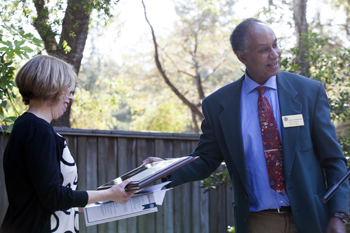Campus News
History professor Kate Jones receives Dizikes Award for teaching in Humanities
History professor Kate Jones was presented with the John Dizikes Teaching Award in Humanities at the Humanities Division’s 2015 Spring Awards celebration.

HUGRA awards afternoon, Thursday 4 June 2015.



History professor Kate Jones was presented with the John Dizikes Teaching Award in Humanities at the Humanities Division’s 2015 Spring Awards celebration held at the Cowell Provost House.
Established in 2002 to honor outstanding teaching by humanities faculty, the award was named in honor of one of UC Santa Cruz’s founding faculty members.
Now a professor emeritus of American studies, John Dizikes served as Cowell College provost and mentored thousands of students during his 30-year teaching career.
In addition to being honored with a check for $3,000, Jones was also entitled to select an undergraduate student to receive a $3,000 scholarship. She chose Jacob Perez, a senior history major who aspires to be a high school history teacher.
“Fundamentally I see teaching as a wide-ranging, sometimes ragged, sometimes ecstatic process that depends on collaboration and experimentation,” Jones noted. “Before I ever walk into a classroom, I get to collaborate with hundreds of people–poring over the work of other scholars, searching for images or rich passages for shared investigation, and buttonholing colleagues to ask about how they approach challenges in the classroom.”
She added that the classroom should be a place where students and teachers can experiment with ways of knowing and ways of learning.
“Sometimes this means a day of classroom transcendence, when you can feel the energy of engagement and genuine exchange of ideas suffusing the space,” said Jones. “Other times it means modeling both the willingness to experiment and the willingness to fail, for example when a new assignment fails to cohere in the way one imagined.”
“Teaching feels like doing a high-wire act on a windy day–the conditions change rapidly, techniques that worked last time might not work this time, but you move forward in confidence that there is a net beneath you, strongly knit out of a sense of common cause, and the knowledge that everyone wants you to get back up there even if you do fall off.”
Student scholarship recipient Perez noted that his definition of history has changed after four years of study on campus, taking history classes ranging from the Civil War to modern East Asia.
“After taking my first couple of history classes here at UC Santa Cruz, I slowly began to realize that history was much more than just facts about events that had happened in the past,” said Perez. “The idea of a dichotomy in history–one true narrative and false narrative to explain any given event–was very quickly dispelled.”
“The various history professors at UC Santa Cruz quickly revealed to me different viewpoints that caused me to question the simplicity of history. I realized that nothing in the world is so black and white, and that every story told, every narrative shared, should not quickly be accepted as fact but looked at through a critical lens.”
“History is being able to critically think and question if the historical narratives being told are correct, or is there an agenda that is giving misinformation about the event,” he added. “I want to teach my future students to be critical thinkers and to constantly question if what they are being told is true.”